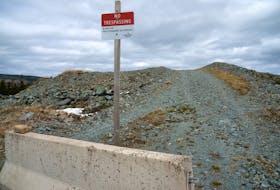
CORNER BROOK One of the keys to Canada maintaining its prosperity on the world’s stage is to ensure it has a strong, resourceful navy.
That was the message delivered to by Lt.-Cmdr. Rod Druggett when the executive officer of the HMCS Montreal addressed members of the Greater Corner Brook Board of Trade during a luncheon Wednesday.
The 25-year veteran of the navy who is a native of Lark Harbour in the Bay of Islands said many Canadians do not understand, let alone appreciate the fact Canada — which has the longest coastline of any country in the entire world — is a maritime country.
“It’s important for you as leaders in this country to appreciate that Canada must start acting like the maritime nation that she is,” Druggett told the board members present.
Calling on the navy as a first response to a crisis anywhere around the world is nothing new, as Druggett alluded to by mentioning Canada’s response to major events ranging from the Korean conflict back in the 1950s right up to deploying in response to unrest in Libya and other North African states earlier this year.
At home, one of the major focuses of the Canadian navy is sovereignty patrols along the Atlantic, Pacific and Arctic coastlines, especially in the north as climate change continues to open up access to that area for more than just Canada.
“We are a maritime nation that relies on the sea for our own prosperity and security,” said Druggett. “Unfortunately, sometimes, as Canadians, we don’t appreciate the role of the oceans in the global economic system. Most Canadians tend to view Canada’s trade as a north-south relationship that travels by truck on a series of highways. The fact remains that 42 per cent of our trade also travels by sea.”
To overcome this “maritime blindness,” Druggett said Canadians have to support growing the navy in a way that can respond to the country’s own needs and still be ready to do the work it is renowned for on a global scale.
“Our navy will be needed more by our children and grandchildren than by us today,” he said.
Plans are already being made, continued Druggett, to upgrade an eventually replace much of Canada’s fleet of supply ships, frigates, destroyers, coastal patrol ships and submarines.
The goal is to ensure that the oceans, whether Canadian waters or international shipping routes, remain safe in the decades to come.
“I am optimistic, as we continue informing Canadians about the reality of Canada as a maritime nation ... that Canadians will begin to understand and appreciate that our peace and prosperity is linked not only to our ocean estate but to a regulated ocean commons as well,” said Druggett.
“By doing so, Canadians will be poised to benefit from the coming maritime century, especially as it pertains to our own Arctic ocean.”








